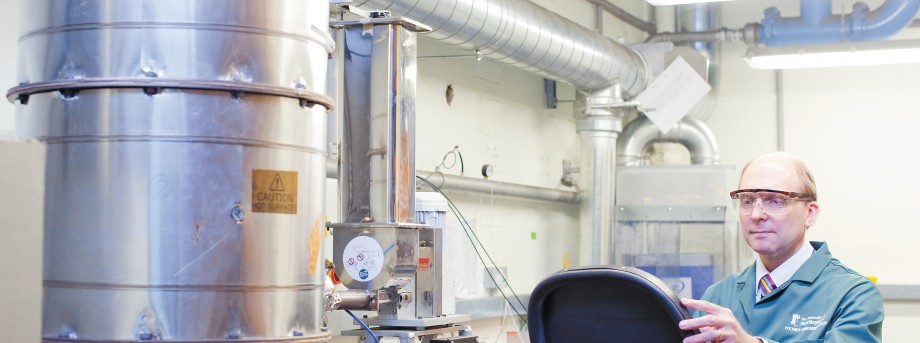The University of Nottingham
 Exchange online
Exchange online
Research Exchange
In desert ‘aircraft graveyards’, where retired planes often go when flight service ends, good parts are removed and sold and many materials are recycled. Increasingly popular strong, light carbon fibre composites (or carbon fibre reinforced plastics) were once too difficult to recycle, so went to landfill.
In the past decade, researchers at Nottingham led by Dr Steve Pickering have developed ways to recycle carbon fibre composites. They have worked with Boeing since 2006. Now Boeing plans to invest $1m per year in a strategic research collaboration – an inclusive partnership in which Boeing will collaborate with Nottingham in all its composites recycling activities.
First introduced into military aircraft 30 years ago, carbon fibre composites are stronger and lighter than any other commonly available material. This helps reduce fuel consumption and carbon emissions in aircraft making modern passenger planes more efficient and cheaper to fly. Advanced composite materials comprise half the empty weight of Boeing’s new 787 Dreamliner.
“Boeing wants to be able to recycle composite materials from manufacturing operations to improve product sustainability and to develop more efficient ways of recycling aircraft retired from commercial service,” said Sir Roger Bone, President of Boeing UK Ltd.
“The ultimate aim is to insert recycled materials back into the manufacturing process, for instance on the plane in non-structural sustainable interiors applications, or in the tooling we use for manufacture. This work helps us create environmental solutions throughout the lifecycle of Boeing products.”
“Aerospace is a priority research area for this University,” said Professor Andy Long, Dean of the Faculty of Engineering, Professor of Mechanics of Materials and Director of the Institute for Aerospace Technology. “This recognises the sector’s potential for growth and our ability to deliver influential world-class research and knowledge transfer to address global issues and challenges.
“Our agreement formalises a long-term working commitment between The University of Nottingham and Boeing. We have been working together for over six years on mutual R&D activities in aircraft recycling as well as novel applications for power electronics. We share the aims of improving environmental performance of aircraft and using materials more sustainably.”
In the strategic collaboration on composites recycling Boeing will provide funding of $1m per year initially for three years, but with the intention to continue with a rolling programme.
Leave a Reply
Other

Top prize for quantum physicist
A University of Nottingham physicist has won a prestigious medal from the Institute of Physics for […]

Zero carbon HOUSE designed and built by students comes home
Design and construct a low cost, zero carbon, family starter home, transport it to Spain, build […]
